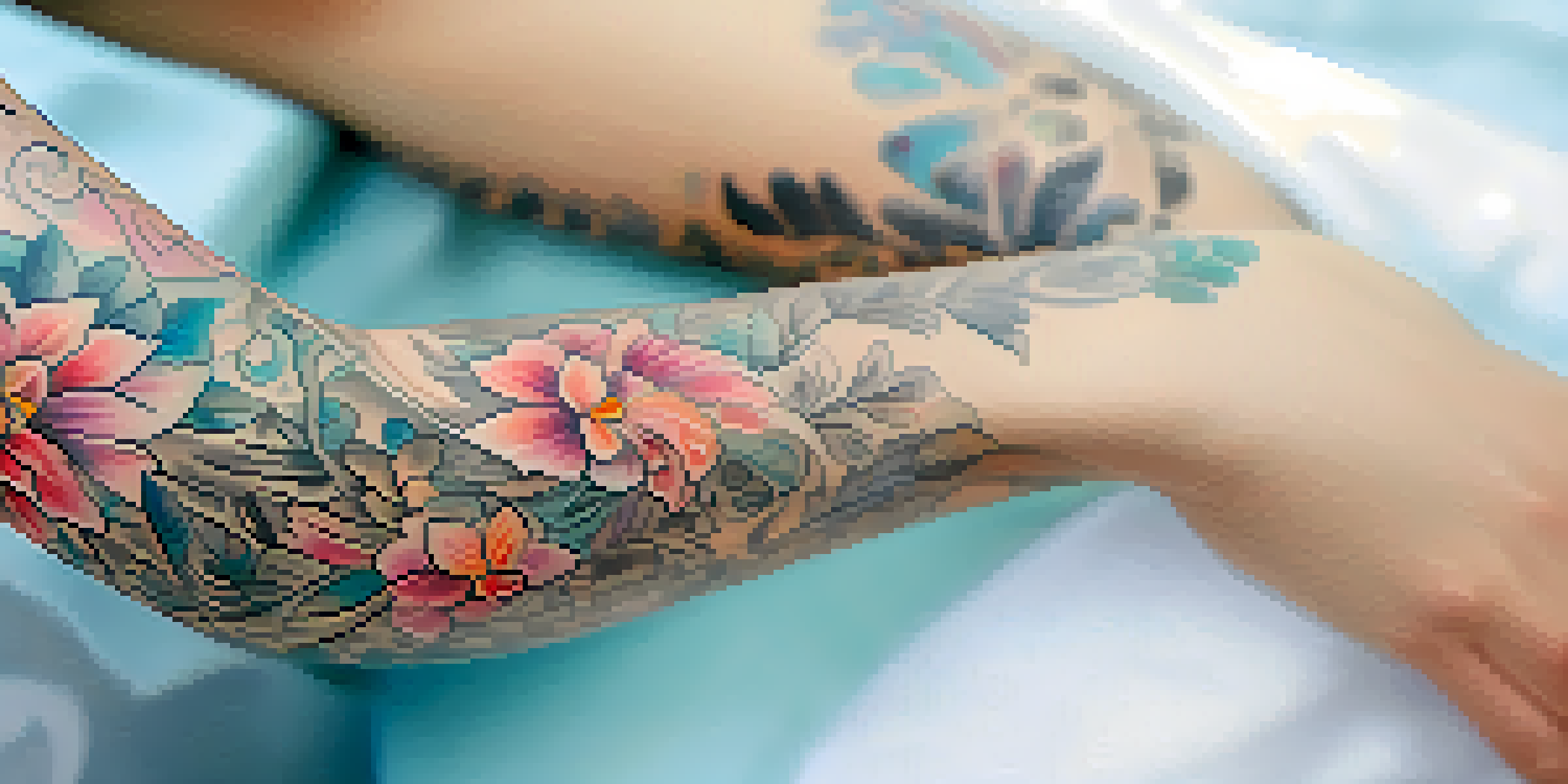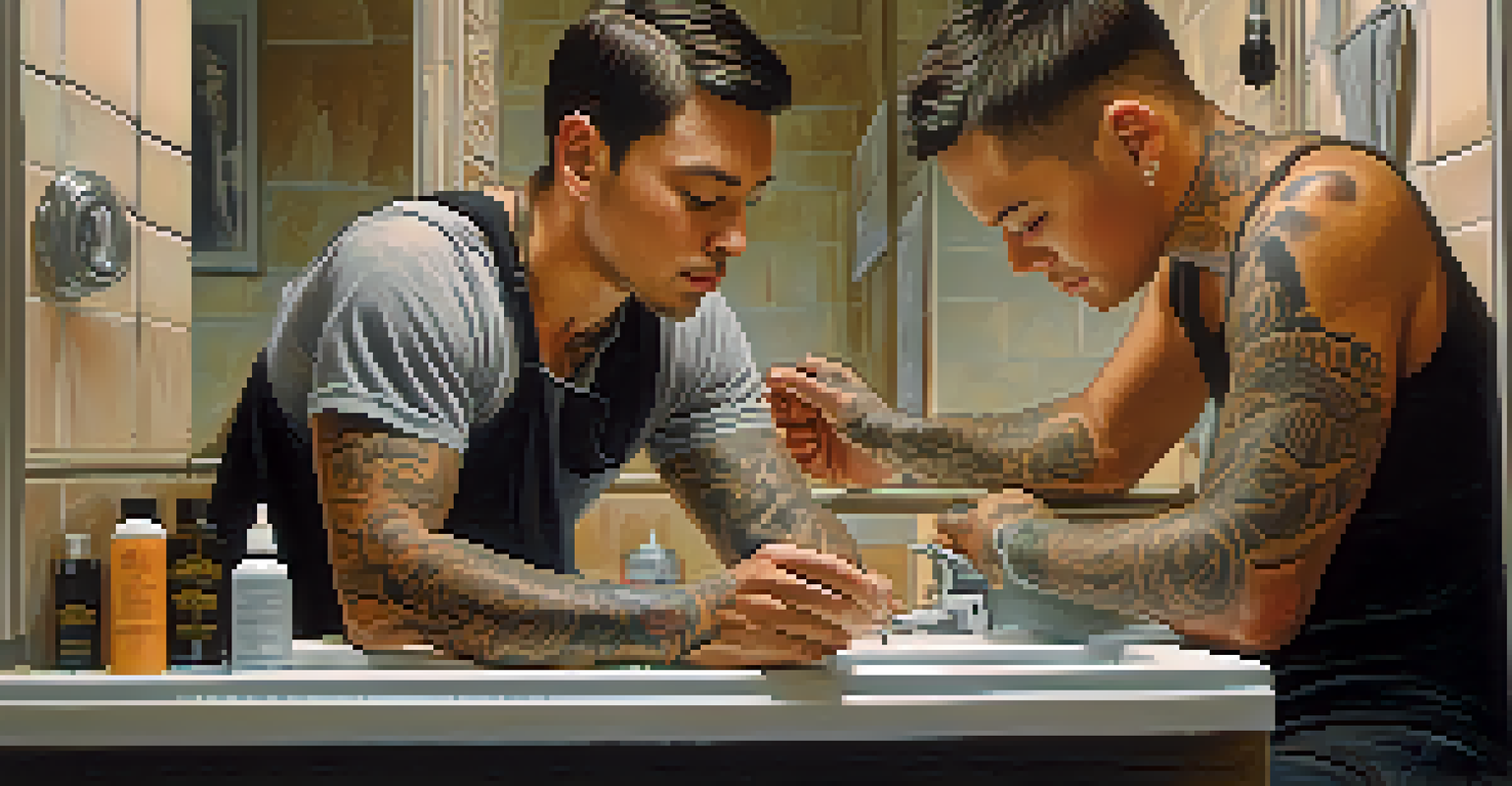The Psychology of Tattoo Choices: What Your Ink Says About You

The Emotional Significance Behind Tattoo Choices
Tattoos often serve as a powerful form of self-expression. For many, they symbolize significant life events, beliefs, or personal milestones. This emotional connection can manifest in various designs, from simple symbols to intricate portraits, each telling a unique story.
Tattoos are a symbol of what you want to be, not just who you are.
When individuals choose a tattoo, they might be reflecting a moment of triumph or a way to cope with loss. For example, someone may get a tattoo of a loved one’s name to keep their memory alive. These choices reveal deep-seated emotions and values that guide people through their lives.
In essence, tattoos can be seen as personal narratives etched on the skin, signifying what matters most to the wearer. This emotional layer adds depth to the art, making each tattoo a unique chapter in the individual's life story.
Cultural Influences on Tattoo Choices
Cultural backgrounds play a significant role in shaping tattoo preferences. Different cultures have unique traditions and meanings associated with specific designs, which influence individual choices. For example, tribal tattoos often represent heritage and community, conveying a sense of belonging.

Moreover, as globalization continues to blend cultures, tattoos have evolved to reflect a mix of influences. Someone might choose a design that merges their heritage with contemporary styles, creating a personal and meaningful piece of art. This blending can illustrate the wearer's journey and identity.
Tattoos Reflect Personal Stories
Tattoos serve as emotional narratives that symbolize significant life events and personal milestones for the wearer.
Ultimately, understanding the cultural context behind tattoo choices can provide insight into the wearer's values and beliefs. It emphasizes how tattoos are not just personal expressions but also reflections of the broader cultural tapestry they belong to.
Personality Traits and Tattoo Preferences
Research suggests that tattoos can be linked to specific personality traits. For instance, those who opt for bold and intricate designs may be more extroverted and adventurous. In contrast, individuals who choose minimalistic tattoos might lean towards introversion and simplicity.
A tattoo is a story that is written on your skin, a memory that lasts forever.
Moreover, certain themes in tattoo choices can reveal underlying personality characteristics. A person who opts for nature-inspired tattoos might value peace and tranquility, while someone with geometric designs may appreciate structure and order. These choices offer a glimpse into the complex personality of the wearer.
Understanding these connections can be both enlightening and fun, as it allows people to see tattoos as more than just art. Instead, they can be viewed as a visual representation of who someone is at their core.
The Role of Peer Influence in Tattoo Decisions
Peer influence can significantly impact tattoo choices, especially among younger individuals. Friends or social circles can sway decisions about designs, placements, and even the act of getting inked. This communal aspect can make the tattoo experience feel more significant and shared.
In some cases, people may choose tattoos that reflect their group identity or to demonstrate loyalty to friends. For example, matching tattoos among close friends can symbolize unity and shared experiences, creating a bond that extends beyond words.
Cultural Context Shapes Tattoo Choices
Cultural influences play a crucial role in determining tattoo designs, merging heritage with contemporary styles.
However, it’s essential to balance personal desires with peer influences. While friendship can inspire meaningful tattoos, individuals must ensure their choices resonate with their personal stories and not just conform to group norms.
Tattoo Choices as a Form of Rebellion
For many, getting a tattoo can be an act of rebellion or defiance. This is especially true for individuals who feel constrained by societal norms or family expectations. Tattoos become a way to assert independence and express individuality in a world that often encourages conformity.
This rebellious spirit can manifest in bold designs, unconventional placements, or messages that challenge societal norms. For instance, someone might choose a tattoo that showcases a controversial symbol or phrase to provoke thought and reaction.
In this context, tattoos serve as a powerful vehicle for self-assertion and personal freedom. They reflect a desire to break free from conventional boundaries and embrace one’s unique identity, regardless of societal pressure.
The Connection Between Tattoos and Life Transitions
Life transitions often prompt individuals to consider getting a tattoo as a way to mark change. Whether it’s graduating from school, overcoming a personal challenge, or going through a significant life event, tattoos can symbolize new beginnings and personal growth.
For example, a person might choose to get a tattoo after a breakup to represent healing and moving forward. These tattoos often carry profound meanings, serving as reminders of strength and resilience during challenging times.
Tattoos Mark Life Transitions
Individuals often get tattoos during major life changes, using them as symbols of growth and resilience.
By connecting tattoos to life transitions, wearers can create a visual timeline of their experiences. Each tattoo becomes a milestone, a testament to their journey and evolution as individuals.
Tattoo Aftercare and Its Psychological Impact
The process of getting a tattoo doesn’t end with the needle; aftercare plays a crucial role in the overall experience. Proper aftercare is essential for healing and maintaining the tattoo's appearance, but it can also have psychological implications for the wearer.
Engaging in aftercare routines allows individuals to nurture their tattoos, reinforcing the emotional connection they have with their ink. This nurturing process can be therapeutic, as it encourages mindfulness and self-care, reminding the wearer of the significance behind their choice.

Moreover, the way someone cares for their tattoo can reflect their personality traits. Someone meticulous about their aftercare might be detail-oriented and value aesthetics, while another might take a more relaxed approach. This element adds another layer to understanding what tattoos say about the individual.